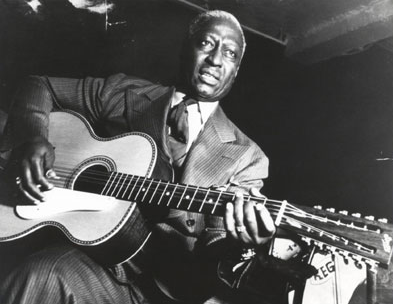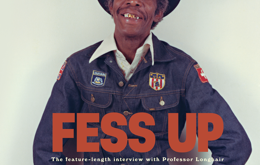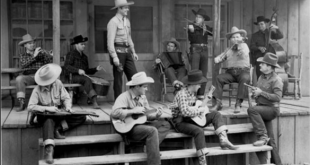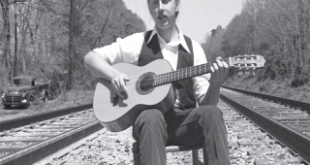Some guys just can’t stay out of trouble. In 1998, Texas Governor George W. Bush revoked the 1925 pardon granted Huddie Ledbetter by Governor Pat Neff. The reason? “It [the pardon] sent the wrong message to school children, criminals, and victims of crime in Texas.” (At the time of his pardon’s revocation, Ledbetter had been dead nearly half a century.)
Odds are the number of `at risk youth’ looking to a folk singing felon as role model in 1998 was nil, but Bush’s gesture was an unintended tribute to an `outlaw’ artist’s enduring power. Lead Belly is a mythic figure in American music. Though largely forgotten, he resurfaces briefly every couple of decades, like some cultural coelacanth, to inspire awe among those who catch a fleeting glimpse.
His influence was greatest late in his life and in the years immediately after his death. “Goodnight Irene,” popularized by Lead Belly on radio in the 1940s, became a national hit when the Weavers covered it in 1950. Post-Blitz kids in Britain took a shine to Lead Belly’s songs: Lonnie Donegan made a `skiffle’ hit of “Rock Island Line,” and a young Johnny Cash covered it for country fans in 1957.
The Folkways label kept many of Lead Belly’s songs circulating on Lp through the Sixties; Ry Cooder and others who’d grown up with those albums continued to rework Lead Belly songs in the Seventies. A Gordon Parks-directed biopic, Leadbelly, hit screens in 1976. Columbia Records released Folkways: a Vision Shared: a Tribute to Woody Guthrie and Leadbelly, featuring revisions of their music by such then-hot acts as U2 and Bruce Springsteen, in 1988. (It won a Grammy.) A major biography, The Life & Legend of Leadbelly by Charles Wolfe and Kip Lornell, was published in 1992. But Lead Belly’s been pretty quiet in the 21st century—at least till now.
Lead Belly: The Smithsonian Folkways Collection is a staggering celebration of the man and his music comprised of 5 CDs offering 108 songs gleaned from recordings spanning his 1934 field recordings through the `last sessions’ taped before his 1949 death. Presented as a hardbound coffee table book, 140 pages tell the story of Lead Belly’s life and cultural impact, the text leavened with striking photos.
It’s a stunning artifact and tribute to`the king of the 12-string guitar,’ one of the great exemplars of the Songster tradition which embraced and personalized music from a range of folk traditions (and the occasional pop tune). Blues, work songs, play party songs’ for kids, weepers, spirituals, ballads, and the rumblings of what would become rock `n roll are all onboard. There’s a vital power stirring through Lead Belly’s music, still inspiring and even a touch dangerous, as that revoked pardon bore witness.
 Baja Review A community newspaper serving Ensenada, Valle de Guadalupe, and Rosarito in Northern Baja California
Baja Review A community newspaper serving Ensenada, Valle de Guadalupe, and Rosarito in Northern Baja California





